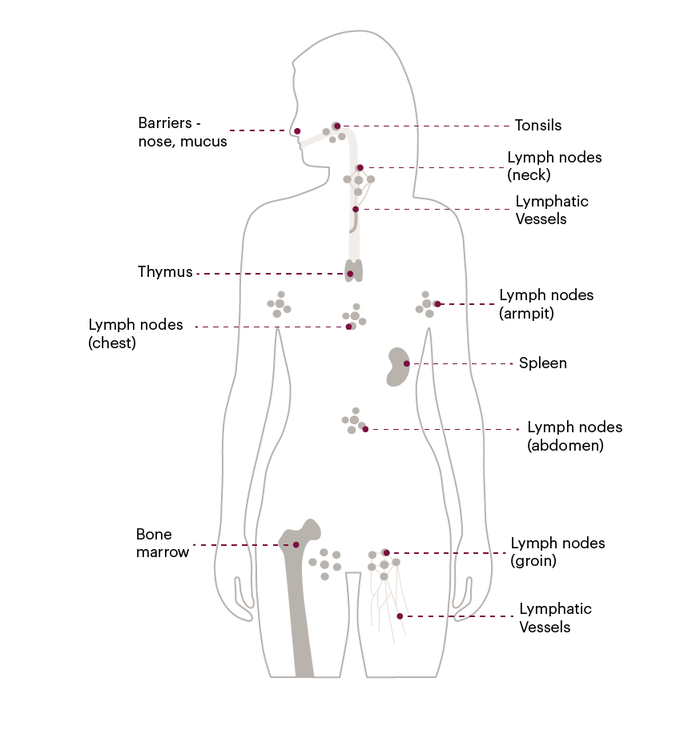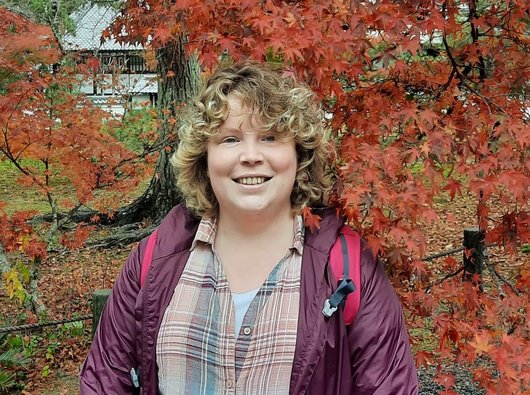What is diffuse large B-cell lymphoma (DLBCL)?
Read about the most common form of non-Hodgkin lymphoma and understand some common medical terms you may hear.
What you need to know:
- DLBCL affects white blood cells called B lymphocytes or B cells.
- Abnormal B cells clump together in your glands (lymph nodes) or other organs, causing lumps or swellings.
- DLBCL is fast growing (high grade) but can be cured with treatment
DLBCL explained
Diffuse large B-cell lymphoma is a type of blood cancer. Cancer is a word that’s used when something goes wrong with the production of cells.
In DLBCL, something goes wrong with the production of white blood cells called B lymphocytes, or just B cells.
Your B cells usually help to keep you healthy by fighting infection. When you have DLBCL, they clump together in your glands (lymph nodes) or other organs, causing swellings or lumps.
You may be able to feel swollen lymph nodes, depending on where they are. They will be easier to feel in your neck, armpit or groin. They can also be in your chest or stomach area, which are less easy to feel.
If you have DLBCL, the symptoms you have will depend on where the lumps are and how big they are. Read our information about the symptoms of DLBCL.

Where lymph nodes (glands) are found in the body
Finding out you have blood cancer
It’s hard to find out you have a type of cancer. For most people it’s a loaded and scary word and it can be difficult to discuss with loved ones. If you want to talk to someone about your diagnosis, call our Support Service nurses on 0808 2080 888. They are here to listen and support you.

Your lymphatic system
Your lymph nodes are part of your lymphatic system. This is made up of a network of thin tubes called lymph vessels that connect your lymph nodes. A fluid called lymph travels through the vessels and nodes. As you might expect, lymph contains lots of lymphocytes, including B cells.
The lymphatic system also includes the spleen, the tonsils and a small gland in the chest called the thymus. It is part of our immune system, which protects us from infection.
In DLBCL, abnormal B cells clump together in the lymph nodes. Because every organ in the body, including your skin, is connected to the lymphatic system, DLBCL can also affect any organ in the body.
What does diffuse large B-cell lymphoma mean?
- DLBCL is diffuse because the pattern of the abnormal cells in a lymph node looks spread out under a microscope.
- It is large because the abnormal B cells are larger than normal ones.
- It involves B cells – other types of white blood cell are not typically affected by DLBCL.
- It is a type of lymphoma – a blood cancer that affects the lymphatic system.
Other terms you may hear
Hodgkin or non-Hodgkin lymphoma?
DLBCL is a type of non-Hodgkin lymphoma.
The two main types of lymphoma are Hodgkin and non-Hodgkin. They both affect lymphocytes but in different ways.
Doctors will look at a biopsy (tissue) sample under a microscope. If they find abnormal cells called Reed-Sternberg cells, your diagnosis will be Hodgkin lymphoma.
If you have lymphoma but there are no Reed-Sternberg cells, the diagnosis will be non-Hodgkin lymphoma. DLBCL is the most common type, but there are other types.
We have separate information about Hodgkin lymphoma.
High grade or low grade?
Non-Hodgkin lymphoma can be either high grade or low grade. High grade means fast growing and low grade means slow growing.
DLBCL is the most common high grade non-Hodgkin lymphoma but there are other types. For all types of high grade non-Hodgkin lymphoma treatment is usually urgent and aims for a cure.
Low grade non-Hodgkin lymphoma may not need treatment for some time. Follicular lymphoma is the most common type of low grade non-Hodgkin lymphoma.
B-cell or T-cell?
Most types of high grade non-Hodgkin lymphoma affect white blood cells called B cells. More rarely, they affect other white blood cells called T cells or NK cells.
"Stick to trustworthy sources of information like UK cancer charities. Otherwise you will read things that don’t apply to you, and that can make you panic."
Katherine, diagnosed with T cell rich large B-cell lymphoma in 2021
Read Katherine's story about finding hope in other people's experiences.

What causes DLBCL?
Nearly 5,500 people are diagnosed with large B-cell non-Hodgkin lymphomas every year in the UK.
In most cases, we can’t say what causes DLBCL. But there are some things that could make you more likely to develop it:
- Age: DLBCL is most common in people over 60, but can happen at any age. It is very rare in children.
- Sex: Men are slightly more likely than women to develop DLBCL – we don’t know why.
- Family history: Your risk of getting DLBCL is slightly higher than normal if you have a close family member who has been diagnosed with blood cancer. But for most people with DLBCL, there is no history of blood cancer in the family. If you are worried about family history, speak to your hospital team.
- Immune suppression: You may be at higher risk of developing DLBCL if you have been taking medicine to dampen your immune system. This might be to treat another condition, or after an organ or stem cell transplant.
- HIV virus: There is a link between the human immunodeficiency virus (HIV) and DLBCL, but most people with HIV won’t develop DLBCL if the HIV is treated and well controlled.
- Epstein Barr virus (EBV): People who have had the EBV virus in the past may be at higher risk of getting DLBCL, but this is rare.
- Transformation of low-grade non-Hodgkin lymphoma: Rarely, a low grade (slow growing) type of non-Hodgkin lymphoma can develop into a high grade (fast growing) one. This is called transformation. Each year, around 3% of people (three people in every 100) with follicular lymphoma will transform to high grade non-Hodgkin lymphoma, usually to DLBCL.
It's important to realise that there's nothing you could have done to stop yourself getting DLBCL or any other type of high grade non-Hodgkin lymphoma. You can’t catch it or pass it on to someone else.
